9 Dec 2014 | Azerbaijan, Azerbaijan News, Magazine, News and features, Volume 43.04 Winter 2014

Campaigners outside the Baku court where members of N!DA were being sentenced (Photo: © Jahangir Yusif)
Azerbaijani activists Rasul Jafarov and Rebecca Vincent wrote an article for Index on Censorship magazine in December 2013 covering attacks on photojournalists, featured alongside a photo essay by photographers. A year later, the magazine asked Vincent to return to the issue, and cover how the past year has meant increasing risks for photographers, journalists and activists. One of the original photographers Jahangir Yusif returns to Index to illustrate the story. Jafarov is currently detained by the government, awaiting trial. Below, is a preview of the article to be featured in the next issue of the magazine.
Azerbaijani human rights defender Rasul Jafarov and I co-authored a piece for Index on Censorship magazine on behalf of the Art for Democracy campaign, focusing on the pressure faced by Azerbaijani photographers who covered risky topics such as corruption and human rights abuses. The piece ran alongside a photo story by some of the country’s most talented independent photographers.
That piece was typical of the work of the Art for Democracy campaign, which used all forms of artistic expression to promote democracy and human rights in Azerbaijan. Now, a year later, the human rights situation in Azerbaijan has worsened immeasurably. Rasul Jafarov was arrested and remains in detention, facing a serious jail sentence on fabricated and politically motivated charges, alongside a number of other prominent human rights defenders. Art for Democracy’s activities have been effectively suspended, as well as the operations of nearly all of the remaining human rights NGOs in the country.
Indeed, the past year has seen the most unprecedented of all human rights crackdowns to date in Azerbaijan, as the authorities work aggressively to silence the country’s few remaining voices. As a result, there are currently more than 90 reported political prisoners in Azerbaijan, including some of the country’s leading human rights defenders, lawyers, journalists, and bloggers.

Police and activists clash during the run-up to the presidential election (Photo: © Jahangir Yusif)
Rasul Jafarov’s case bears all the hallmarks of the pressure exerted on human rights defenders in Azerbaijan. He had been on the authorities’ radar for years, with his earlier work for the Institute for Reporters’ Freedom and Safety and, since December 2010, in his role as the founder and Chairman of the Human Rights Club. Perhaps most notably, Jafarov co-ordinated the Sing for Democracy campaign, which used the May 2012 Eurovision Song Contest, held in the capital Baku, as a platform to expose on-going human rights violations in the country and promote democratic change. He was the driving force behind the creation of the Art for Democracy campaign.
Alongside Art for Democracy’s activities, Jafarov worked to expose the situation of political prisoners. On the eve of the October 2013 presidential election the Human Rights Club released a list Jafarov had compiled of political prisoners, revealing a shocking 144 cases. The election itself was marred by widespread electoral fraud and saw incumbent President Ilham Aliyev re-elected for a third term in office.
In 2014, Jafarov continued working on the list and coordinating efforts among NGOs to achieve consensus and develop a joint version of the list, which would prove crucial to international advocacy efforts. Along with some of the other human rights defenders who have since been targeted, Jafarov repeatedly raised the issue at the Council of Europe, and advocated the appointment of a new special rapporteur to take up the work of a previous rapporteur whose efforts were defeated by lobbying from the Azerbaijani government. Jafarov also announced plans to launch a new campaign, Sports for Rights, ahead of the first European Games, which are due to be held in Baku in June 2015.
As a result of these activities, Jafarov faced a number of pressures from the authorities, but he persevered. He was aware of the risks, but also remained hopeful that the situation in his country would improve. He was dedicated to his work defending the rights of others and attempting to hold his government to account. Indeed he remains passionately committed to these aims even now, in detention.
After having his bank account frozen and being prevented from travelling outside of the country, Jafarov was arrested on 2 August and charged with illegal entrepreneurship, abuse of office, and tax evasion. The fabricated and politically motivated charges were similar to those used against other prominent human rights defenders. Some of the charges were linked to the fact that the Human Rights Club remained unregistered, despite the fact that Jafarov had been attempting to register the NGO with the state for more than three years, an issue pending consideration by the European Court of Human Rights. Jafarov remains held at the Kurdekhani detention centre, awaiting trial.
Jafarov is only one of many prominent human rights defenders to have been targeted in Azerbaijan in recent months. On 26 May, the chairman of the Election Monitoring and Democracy Studies Centre Anar Mammadli, was sentenced to five and a half years in jail, and his colleague Bashir Suleymanli to three and a half years on charges including illegal entrepreneurship, abuse of office, and tax evasion. Elnur Mammadov of the International Cooperation of Volunteers’ Union was also sentenced to two years on probation.

Protesters campaign for the release of imprisoned activists (Photo: © Jahangir Yusif)
On 30 July, the head of the Institute for Peace and Democracy, Leyla Yunus, was arrested on politically motivated charges of treason, fraud, forgery, tax evasion, and abuse of office. Her husband, an activist in his own right, Arif Yunus, was arrested on 5 August on charges of treason and fraud. On 8 August, the head of the Legal Education Society Intigam Aliyev was arrested on similar politically motivated charges: illegal entrepreneurship, abuse of office, and tax evasion. There are now a total of nine human rights defenders behind bars in Azerbaijan. In addition, the whereabouts of the director of the Institute for Reporters’ Freedom and Safety Emin Huseynov have been unknown since 8 August, the day his organisation’s office was searched and sealed shut by police.
Parallel to these arrests, the authorities have stepped up other forms of pressure against both local and foreign NGOs, making it nearly impossible for organisations working on issues related to human rights and democracy to continue operating in the country. This has resulted in the closure or suspension of activities of many of the remaining human rights NGOs in the country. Parliament continues to tighten legislation related to the operations and financing of NGOs, cutting off vital sources of funding for independent groups and making it difficult to carry out even routine activities.
At the same time, other violations continue, such as pressure against the few remaining opposition and independent media outlets in the country. Prominent investigative journalist Khadija Ismayilova was arrested on 5 December, as government officials and their supporters employed new tactics in their relentless attempts to silence her. Journalists Seymur Khaziyev and Khalid Garayev, both presenters of the Azerbaijan Hour programme, were arrested on 29 August and 29 October respectively, bringing the current total of journalists and bloggers behind bars to 15. The Azadliq newspaper, the country’s main opposition daily newspaper, teeters on the brink of closure, facing serious financial hardship because of excessive fines from civil defamation lawsuits and a number of other pressures from the authorities.
In an ironic twist of fate, in the midst of this unprecedented crackdown, Azerbaijan in May 2014 assumed the chairmanship of Council of Europe, a body whose very purpose is to safeguard human rights and democratic values. Sadly, during Azerbaijan’s chairmanship, the Council of Europe, and, the broader international community, has done little to hold the government to account for its human rights obligations.
Now, with Jafarov and so many of his colleagues behind bars and the organisations they represent effectively paralysed, concrete international support is needed more than ever. Azerbaijan’s few remaining independent voices are under siege and will not be able to hold out much longer.
©Rebecca Vincent
www.indexoncensorship.org
Rebecca Vincent is a human rights activist and former diplomat who writes regularly on human rights issues in Azerbaijan. She served as advocacy director of the Art for Democracy campaign until April 2014
Jahangir Yusif is a photo-journalist whose work was featured in the original article 12 months ago, read the original article here.
Index recently was part of a protest at the Azerbaijani embassy, read more about it here.
This article is from the upcoming winter edition of Index on Censorship magazine. Subscribe to Index on Censorship magazine by Dec 31, 2014 for 25% off a print subscription.
This article was posted on 9 December 2014 and appears in print as Azeri attack in the Winter 2014 Index on Censorship magazine.
5 Dec 2014 | Azerbaijan, Azerbaijan News, News and features

Khadija Ismayilova
The arrest of Azerbaijani investigative journalist Khadija Ismayilova today underscores the entrenched authoritarian instincts of the government of President Ilham Aliyev. Ismayilova was sentenced to a two month pretrial detention.
“The arrest of Khadija Ismayilova is part of Azerbaijan’s continued crackdown on free media and civil society. This confirms the pattern of intimidation and harassment perpetrated by authorities in an attempt to silence critical voices,” Melody Patry, senior advocacy officer at Index on Censorship, said.
Ismayilova’s arrest follows the earlier detentions of human rights defenders Leyla Yunus and her husband Arif Yunus; free speech advocate Rasul Jafarov; journalists Seymur Hezi, Parviz Hashimli, Nijat Aliyev and Sardar Alibeyli; and bloggers Omar Mamedov, Abdul Abilov and Rashad Ramazano. The country has starved the 2014 Index award winning Azadliq newspaper of resources, forcing it to suspend its print edition. The charges against all of the detainees range from hooliganism to illegal storage and sale of drugs.
Today’s action by Azerbaijan’s authorities also drew immediate criticism from Human Rights House Foundation Executive Director Maria Dahle and the OSCE Representative on Freedom of the Media Dunja Mijatović.
“This sentence does not come as a surprise: we assumed the authorities wanted to silence Khadija Ismayilova,” said Dahle. “The arrest has a chilling effect: one must now consider that every independent civil society leader in Azerbaijan is a target and can be arrested at any given time for any charge, as ludicrous as one can imagine. The international community, especially the Council of Europe, must now get a foot in the door to stop the repression, including by stopping further cooperation with Azerbaijan’s authorities”, Dahle added.
“The arrest of Ismayilova is nothing but orchestrated intimidation, which is a part of the ongoing campaign aimed at silencing her free and critical voice,” Mijatović said.
On Friday afternoon, Ismayilova’s usually very active Facebook page was also inaccessible.

Azerbaijan, which spends significant amounts on media relations, presents itself as a modern nation. But behind the smokescreen, the country has been carrying out a systematic suppression of civil society, journalists and independent media.
This article was posted on 5 Dec 2014 at indexoncensorship.org
16 Oct 2014 | Azerbaijan, Azerbaijan Statements, Campaigns, Statements

The Azerbaijani authorities should immediately lift the travel ban imposed on Khadija Ismayilova and cease all legal proceedings against her. Against the backdrop of the unprecedented crackdown on civil society, Khadija Ismayilova’s arrest on criminal defamation charges seems imminent and would confirm the authorities’ intent to silence all critical voices in the country.
As part of the International Partnership Group on Azerbaijan (IPGA), APC, ARTICLE 19, the Committee to Protect Journalists, Index on Censorship, the European Federation of Journalists, Freedom House, Freedom Now, the Human Rights House Foundation, International Media Support, the Media Diversity Institute, PEN International and Reporters without Borders, call on the international community, and in particular Council of Europe member states to immediately and publicly condemn the ongoing harassment and politically motivated criminal charges against Khadija Ismayilova. With the next court hearing taking place on Friday 17 October, at 11.30 in Binagadi district court in Baku, Council of Europe member states should publicly request to attend and send a representative to monitor the hearing.
IPGA members believe that Khadija Ismayilova’s attendance at the most recent session of the Parliamentary Assembly of the Council of Europe (PACE) in Strasbourg triggered the latest string of harassment, including a five hour search upon arrival at the airport following her trip, the criminal defamation charges and the imposition of a travel ban.
“Those who raise concern about the existence of political prisoners in Azerbaijan at the Council of Europe are themselves specifically targeted by the authorities, and such reprisals are incompatible with international human rights standards the Azerbaijani authorities claim to adhere to,” said David Diaz-Jogeix, Director of Programmes of ARTICLE 19.
“The ongoing harassment of one of Azerbaijan’s most outspoken critics follows an unprecedented wave of arrests of human rights defenders, civic activists and journalists in Azerbaijan who have dared to publicly criticise the authorities. Those who have spoken about the issue of political prisoners in Azerbaijan at PACE have been particularly targeted.” said Florian Irminger, Head of Advocacy and Geneva Office at the Human Rights House Foundation (HRHF).
“We are deeply concerned by the increasing persecution of human rights defenders in Azerbaijan and, in particular, continued attempts to stifle free expression through intimidation and harassment of journalists like Khadija Ismayilova and Arzu Geybulla. The international community – and especially the Council of Europe of which Azerbaijan is part – needs to speak out loudly and firmly against the crackdown in Azerbaijan,” stated Jodie Ginsberg, CEO of Index on Censorship.
“Khadija Ismayilova is one of the most recognized investigation journalists in Azerbaijan. Harassing her is sending a clear signal of intimidation to the entire media profession,” Reporters Without Borders deputy programme director Virginie Dangles said.
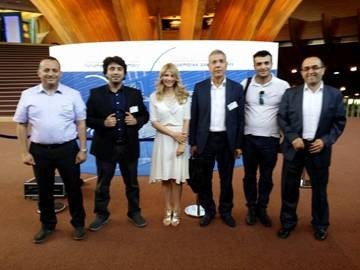
These six human rights defenders, pictured above from left to right here are:
Zohrab Ismayil: forced to leave Azerbaijan, his NGO, Public Association for Assistance to Free Economy, paralysed
Emin Huseynov: unable to work in Azerbaijan, due to legal action against his NGO, Institute for Reporters Freedom of Safety, subject to travel ban
Gulnara Akhundova: forced to leave Azerbaijan, no longer able to represent her NGO, International Media Support from within the country
Rasul Jafarov: in pre-trial detention on politically motivated charges
Intigam Aliyev: in pre-trial detention on politically motivated charges, unable to take his cases at the European Court for Human Rights forward
Rashid Hajili: forced to stop working as human rights defender, his NGO, Media Rights Institute seized operating
The IPGA calls on the Azerbaijani authorities to cease its harassment of Khadija Ismayilova and stop the silencing of its critics through imprisonment and politically motivated legal actions. Member states of the Council of Europe, the main human rights institution in Europe, need to speak up and hold Azerbaijan to account for failing to implement its human rights obligations. With Azerbaijan as chair of its Committee of Ministers until 14 November, the integrity and accountability of the institution is at stake.
For further information about Khadija Ismayilova, also see the recent IPGA report Azerbaijan – when the truth becomes a lie.
13 Oct 2014 | Azerbaijan, Azerbaijan News, Europe and Central Asia, News and features
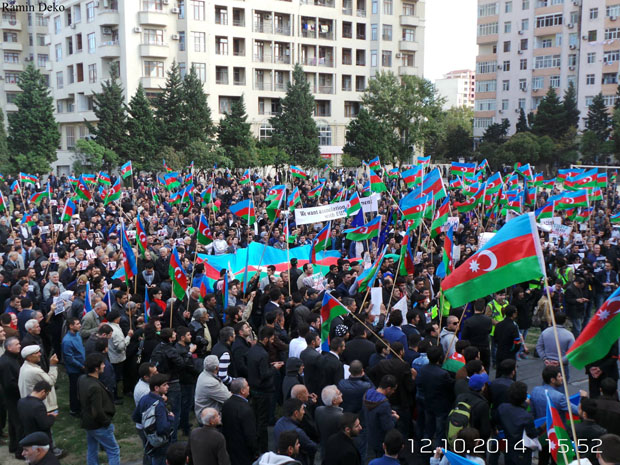
Thousands of Azerbaijanis took to the street on Sunday, calling for the resignation of President Ilham Aliyev, the release of political prisoners and an end to human rights abuses in the country. The protest comes during an ongoing and wide reaching crackdown on regime critics.
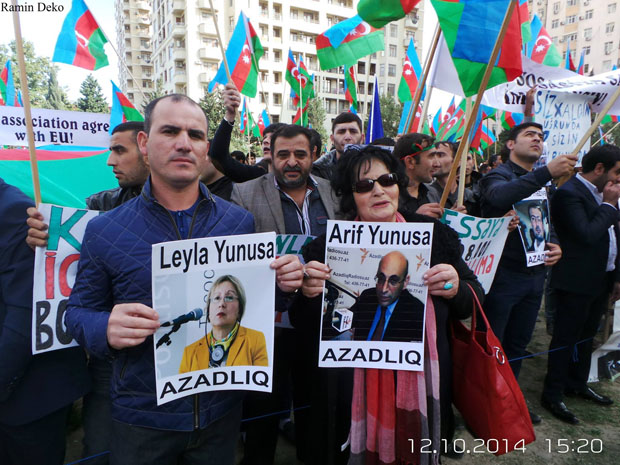
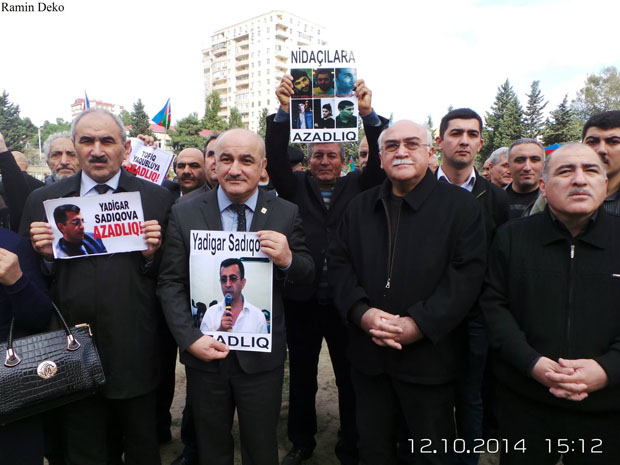
On Saturday, investigative journalist Khadija Ismayilova was placed under a travel ban. The award-winning reporter has covered corruption allegedly connected to Aliyev, and has been targeted by government supporters in the past. She is currently facing criminal charges of libel and document forgery, which she denies and vows to fight.
Last week, Index reported journalist Arzu Geybulla being threatened on social media and accused of treason after being interviewed by Azerbaijani news site Modern.az.
These cases follow the jailing of several prominent and critical voices within Azerbaijan’s civil society. Human rights defender Leyla Yunus and her husband Arif were detained in July, followed by fellow rights activist Rasul Jafarov, lawyer Intigam Aliyev and journalist Seymur Hezi.
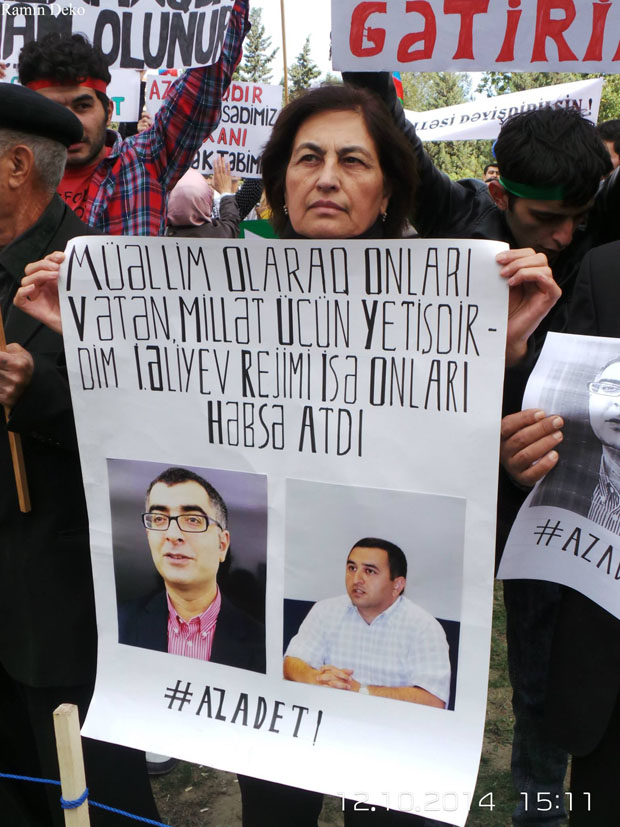
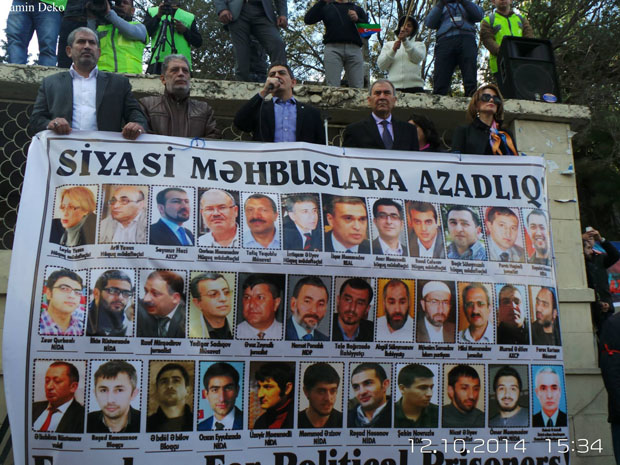
The European Parliament recently called on Azerbaijan — currently chairing the Council of Europe — to release several prominent political prisoners and proceed with reforming the country’s human rights policies. Before being arrested, Jafarov had worked on putting together a detailed list of the country’s political prisoners, with the latest figure coming to 98.
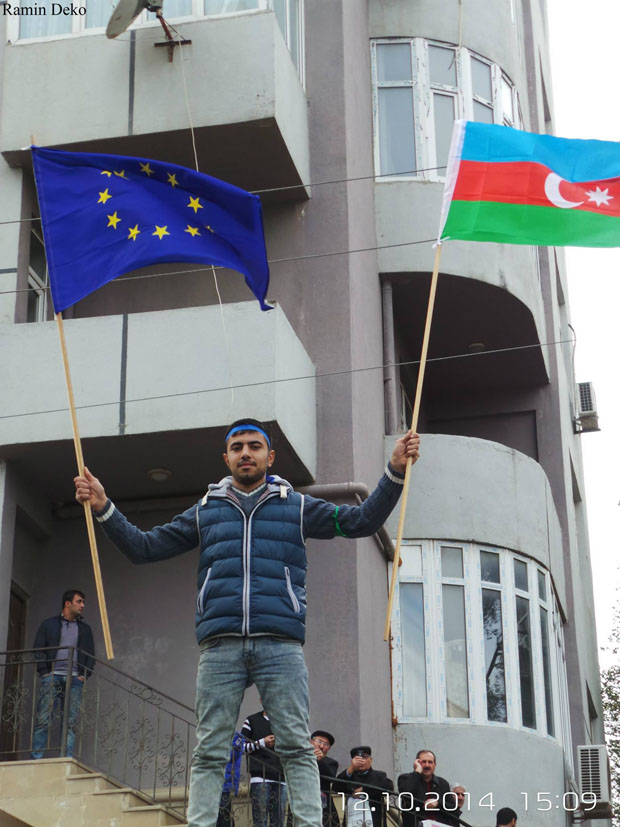
The protest, which also called for closer ties to the European Union, was approved by authorities, but took place in a remote part of Baku.
All photos by Ramin Deko
This article was posted on 10 October 2014 at indexoncensorship.org












